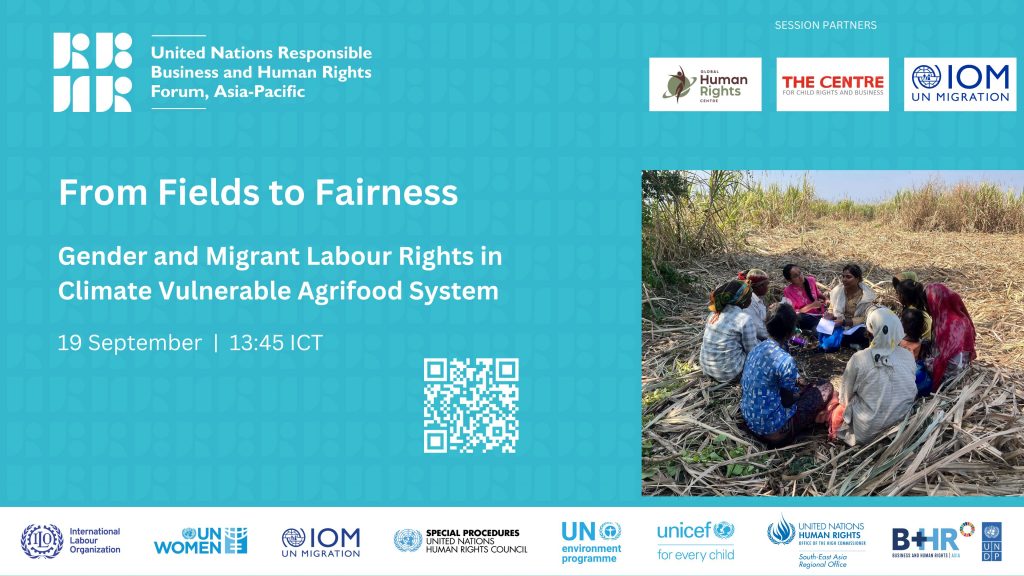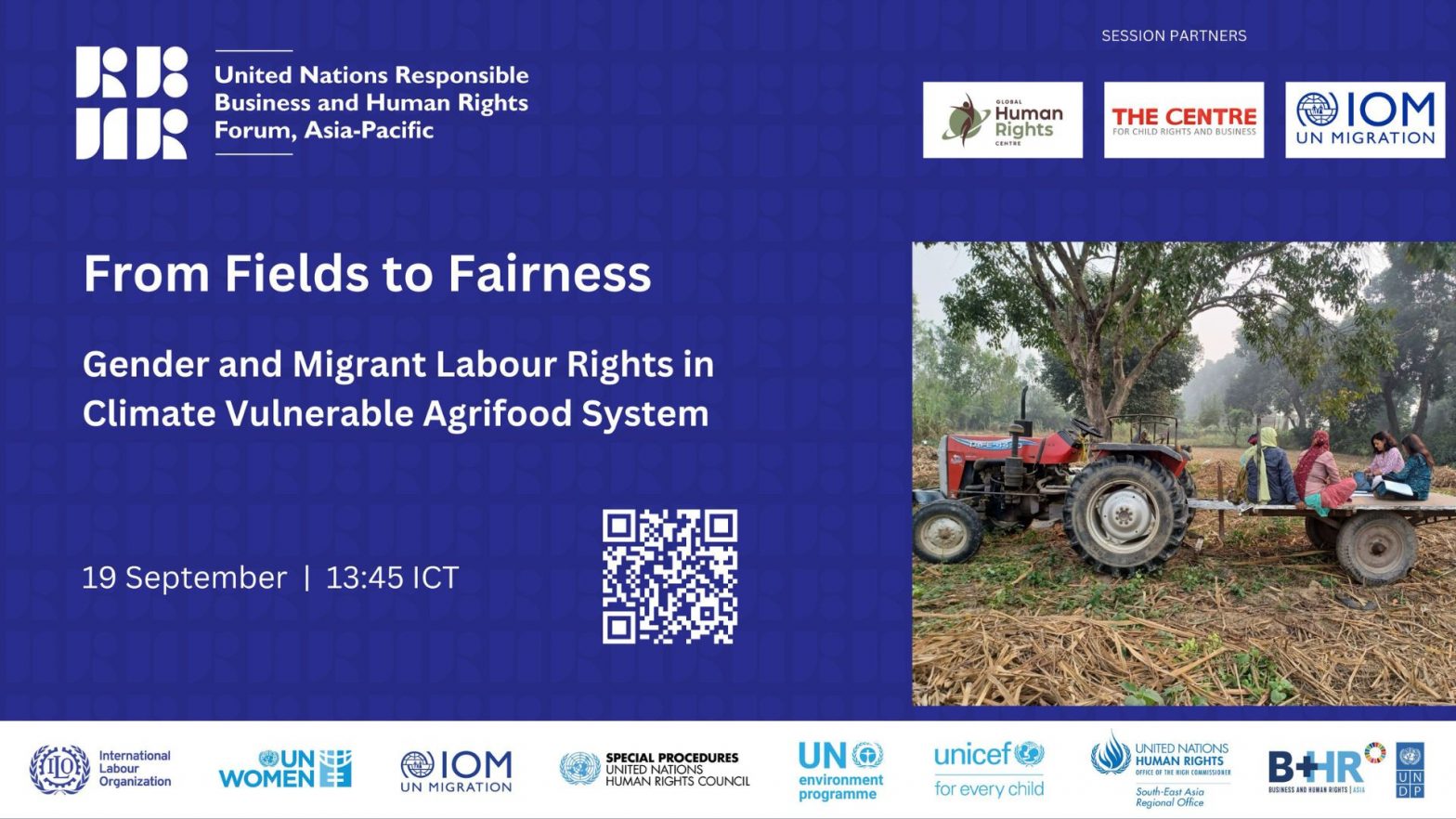
Global Human Rights is serving as a collaborating partner and co-organiser of a session at the 2025 UN Responsible Business and Human Rights Forum, Asia-Pacific together with the United Nations International Organization for Migration (IOM) and The Centre for Child’s Rights and Business.
Date & Time: 19 September 2025, 13:45–14:45 ICT; Room CR4
Session Title: Fields to Fairness: Gender and Migrant Labour Rights in Climate-Vulnerable Agrifood Systems
Panel Chair
Dr Cynthia C. Umezulike, President of Global Human Rights Centre
Speakers
Gayang Ho, Director of Research, The Centre for Child Rights and Business;
Amit Choudhury, National Officer, United Nations International Organization for Migration (IOM)
Marcio Marcio Castro de Souza, United Nations FAO Senior Fishery Officer (International Trade), Secretary of the FAO Sub-Committee on Fish Trade.
Professor Engobo Emeseh, Professor of Law and Head of the Faculty of Law, Aberystwyth University.
CONCEPT NOTE
2025 United Nations Responsible Business and Human Rights Forum: Anchoring Progress and Strengthening Regional Leadership on Human Rights through Crisis.
Abstract
This session, Fields to Fairness: Gender and Migrant Labour Rights in Climate-Vulnerable Agrifood Systems, will explore how climate change, gender inequality, and migrant labour precarity intersect within global agrifood supply chains. As environmental shocks intensify, women and migrant workers face worsening labour conditions, limited protections, and systemic exclusion. Despite growing corporate commitments to sustainability, current human rights due diligence (HRDD) frameworks often overlook these compounded vulnerabilities. Anchored in the UN Guiding Principles on Business and Human Rights, this session will bring together diverse voices to examine how HRDD can be made more climate-just, gender-responsive, and inclusive of migrant worker realities. Through panel discussion and interactive dialogue, the session will identify practical solutions and policy innovations to strengthen accountability and drive fairer, more resilient agrifood systems.
Background and Rationale
Agrifood systems are at the frontline of climate change impacts, where rising temperatures, erratic rainfall, and land degradation disproportionately affect rural workers especially women and migrant labourers. These systems, often reliant on informal and precarious labour, are underpinned by severe human rights and environmental challenges that are compounded by weak corporate accountability and inadequate regulatory oversight.
Rural women and internal migrant workers face significant challenges in navigating cultural and social norms of inequality, often struggling against entrenched societal hierarchies to ensure that vulnerable groups can access the same rights as others. As companies increasingly rely on transnational supply chains to meet global food demand, the rights of those who produce, harvest, and process food particularly women and migrant workers in climate-vulnerable contexts remain poorly protected. Structural discrimination, lack of labour protections, and inadequate access to remedies persist, even as businesses tout sustainability credentials.
Human rights due diligence (HRDD), as mandated under the UN Guiding Principles on Business and Human Rights (UNGPs) and evolving regulatory frameworks (e.g. EU Corporate Sustainability Due Diligence Directive), offers a pathway to embed justice and fairness in agrifood systems. Yet, current HRDD practices often fail to account for the intersection of climate vulnerability, gender, and migration status, leading to superficial compliance rather than transformative change.
This session seeks to foreground the lived realities of gendered and migrant labour in agrifood systems and examine how businesses, governments, and civil society actors can implement HRDD that is climate-just, inclusive, and effective. Our expert panel will share inspiring examples of inclusive, gender-responsive, and climate-conscious HRDD models, promoting a more equitable and sustainable future in agrifood systems.
Key Objectives
- Examine intersecting risks of climate vulnerability, gender inequality, and migrant precarity in agrifood supply chains.
- Develop and scale solutions through tools, stakeholder engagement, and integration into corporate supply chains and National Action Plans (NAPs).
- Advance inclusive progress by addressing HRDD gaps and centering lived experiences, sustainable livelihoods, and equitable remedies for rural women and migrant workers.
Guiding Questions
· In what ways can businesses, governments, and civil society collaborate to ensure fairer remedies and sustainable livelihoods for rural women and migrant workers in climate-vulnerable agrifood systems?
· How can human rights due diligence (HRDD) be strengthened to address the intersecting vulnerabilities of climate change, gender inequality, and migrant precarity in agrifood supply chains?
· What inclusive and gender-responsive models of HRDD show promise in transforming corporate supply chains from superficial compliance to meaningful accountability?
Expected Outcome
- Dissemination of innovative, field-based solutions that integrate gender, climate, and informality into agri-food systems.
- Policy and corporate recommendations to strengthen remedy pathways and accountability in agricultural supply chains.
- Increased momentum for multi-stakeholder collaboration that centres affected communities and delivers concrete improvements.
- Clearer understanding of how HRDD frameworks can address the realities of rural women and migrant workers in agriculture.
About the UN Responsible Business and Human Rights Forum
The 2025 UN Responsible Business and Human Rights Forum will convene stakeholders from across Asia and the Pacific to advance business and human rights in a time of compounding crises. Under the theme “Anchoring Progress and Strengthening Regional Leadership on Human Rights through Crisis,” the Forum will focus on accelerating implementation of BHR standards, strengthening cross-border cooperation, and centering leadership from Asia-Pacific.
Sessions will be organized around four thematic tracks: Policy Coherence and Regulatory Evolution; Markets, Finance and Supply Chains; Inclusion, Protection and Participation; and Sustainability and Transitions. With an emphasis on peer learning and practical solutions, the Forum will create space for governments, businesses, NHRIs, civil society, Indigenous Peoples, and others to share tools, align on priorities, and shape responses grounded in regional realities.
The Forum is co-organized by the International Labour Organization (ILO), International Organization for Migration (IOM), Office of the High Commissioner for Human Rights (OHCHR), United Nations Development Programme (UNDP), United Nations Entity for Gender Equality and the Empowerment of Women (UN Women), United Nations Environmental Programme (UNEP), United Nations Children’s Fund (UNICEF), and the UN Working Group on Business and Human Rights (UNWG).

